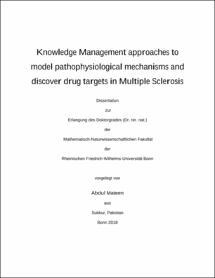Mateen, Abdul: Knowledge Management approaches to model pathophysiological mechanisms and discover drug targets in Multiple Sclerosis. - Bonn, 2019. - Dissertation, Rheinische Friedrich-Wilhelms-Universität Bonn.
Online-Ausgabe in bonndoc: https://nbn-resolving.org/urn:nbn:de:hbz:5n-54442
Online-Ausgabe in bonndoc: https://nbn-resolving.org/urn:nbn:de:hbz:5n-54442
@phdthesis{handle:20.500.11811/7916,
urn: https://nbn-resolving.org/urn:nbn:de:hbz:5n-54442,
author = {{Abdul Mateen}},
title = {Knowledge Management approaches to model pathophysiological mechanisms and discover drug targets in Multiple Sclerosis},
school = {Rheinische Friedrich-Wilhelms-Universität Bonn},
year = 2019,
month = apr,
note = {Multiple Sclerosis (MS) is one of the most prevalent neurodegenerative diseases for which a cure is not yet available. MS is a complex disease for numerous reasons; its etiology is unknown, the diagnosis is not exclusive, the disease course is unpredictable and therapeutic response varies from patient to patient. There are four established subtypes of MS, which are segregated based on different characteristics. Many environmental and genetic factors are considered to play a role in MS etiology, including viral infection, vitamin D deficiency, epigenetical changes and some genes.
Despite the large body of diverse scientific knowledge, from laboratory findings to clinical trials, no integrated model which portrays the underlying mechanisms of the disease state of MS is available. Contemporary therapies only provide reduction in the severity of the disease, and there is an unmet need of efficient drugs. The present thesis provides a knowledge-based rationale to model MS disease mechanisms and identify potential drug candidates by using systems biology approaches. Systems biology is an emerging field which utilizes the computational methods to integrate datasets of various granularities and simulate the disease outcome. It provides a framework to model molecular dynamics with their precise interaction and contextual details.
The proposed approaches were used to extract knowledge from literature by state of the art text mining technologies, integrate it with proprietary data using semantic platforms, and build different models (molecular interactions map, agent based models to simulate disease outcome, and MS disease progression model with respect to time). For better information representation, disease ontology was also developed and a methodology of automatic enrichment was derived. The models provide an insight into the disease, and several pathways were explored by combining the therapeutics and the disease-specific prescriptions. The approaches and models developed in this work resulted in the identification of novel drug candidates that are backed up by existing experimental and clinical knowledge.},
url = {https://hdl.handle.net/20.500.11811/7916}
}
urn: https://nbn-resolving.org/urn:nbn:de:hbz:5n-54442,
author = {{Abdul Mateen}},
title = {Knowledge Management approaches to model pathophysiological mechanisms and discover drug targets in Multiple Sclerosis},
school = {Rheinische Friedrich-Wilhelms-Universität Bonn},
year = 2019,
month = apr,
note = {Multiple Sclerosis (MS) is one of the most prevalent neurodegenerative diseases for which a cure is not yet available. MS is a complex disease for numerous reasons; its etiology is unknown, the diagnosis is not exclusive, the disease course is unpredictable and therapeutic response varies from patient to patient. There are four established subtypes of MS, which are segregated based on different characteristics. Many environmental and genetic factors are considered to play a role in MS etiology, including viral infection, vitamin D deficiency, epigenetical changes and some genes.
Despite the large body of diverse scientific knowledge, from laboratory findings to clinical trials, no integrated model which portrays the underlying mechanisms of the disease state of MS is available. Contemporary therapies only provide reduction in the severity of the disease, and there is an unmet need of efficient drugs. The present thesis provides a knowledge-based rationale to model MS disease mechanisms and identify potential drug candidates by using systems biology approaches. Systems biology is an emerging field which utilizes the computational methods to integrate datasets of various granularities and simulate the disease outcome. It provides a framework to model molecular dynamics with their precise interaction and contextual details.
The proposed approaches were used to extract knowledge from literature by state of the art text mining technologies, integrate it with proprietary data using semantic platforms, and build different models (molecular interactions map, agent based models to simulate disease outcome, and MS disease progression model with respect to time). For better information representation, disease ontology was also developed and a methodology of automatic enrichment was derived. The models provide an insight into the disease, and several pathways were explored by combining the therapeutics and the disease-specific prescriptions. The approaches and models developed in this work resulted in the identification of novel drug candidates that are backed up by existing experimental and clinical knowledge.},
url = {https://hdl.handle.net/20.500.11811/7916}
}






